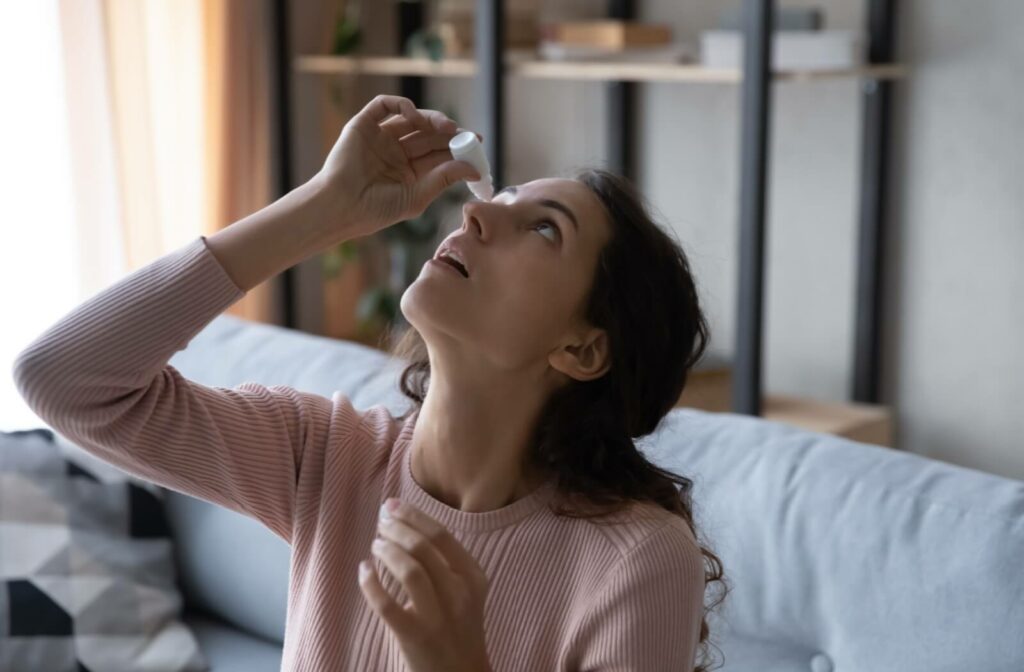A constant stinging sensation—it’s likely a common problem called dry eye syndrome. This constant discomfort can make even the simplest tasks challenging. Whether it’s reading, working, or just spending time outside, dry eye syndrome is an irritating condition that affects millions of people.
For those using Accutane, this burning sensation might be more than just a coincidence. Accutane has been linked to dry eyes as it reduces oil production in the body. Your dry eye syndrome may be due to Accutane usage, though this isn’t the only possible cause. So what can you do?
What Is Dry Eye Syndrome?
Your eyes require a careful balance of tears to keep themselves protected. These tears, made up of 3 layers—water, mucus, and oils—are an essential part of a healthy eye. However, when these layers are imbalanced, it leaves the eye unprotected. This is dry eye syndrome.
Dry eye syndrome causes constant burning and stinging sensations. It may feel like your tears aren’t doing enough, and like your eyes are constantly irritated. Common symptoms include:
- Redness in the eyes
- Blurry vision
- Sensitivity to light
- Excessive tearing
These quickly add up and impact your quality of life.
What Causes Dry Eyes?
Dry eye syndrome is a common condition believed to affect around 30% of Canadians and can be caused by:
- Environmental factors, such as wind, smoke, or dry air
- Aging, which can reduce tear production
- Underlying medical conditions, such as diabetes or rheumatoid arthritis
- Certain medications, including antihistamines, acne medications and blood pressure drugs
What Is Accutane?
Accutane, also known by its generic name isotretinoin, is a powerful medication used to treat severe acne. It works by significantly reducing oil production in the skin. This reduction helps prevent clogged pores and painful acne breakouts, making it a highly effective treatment for those who haven’t had success with other acne treatments.
However, Accutane has a catch—it can impact other parts of the body as well. Accutane reduces oil production in the oil-producing glands in the eyes. This compromises the integrity of your tear film and can lead to dry eye syndrome.
The Side Effects of Accutane
Accutane is known for effectively treating severe acne. However, it also comes with several side effects. This medication is known to cause:
- Dry eyes
- Chapped lips
- Increased sensitivity to sunlight
- Joint and muscle pain
- Mood changes
So if you’re dealing with dry eye syndrome due to your Accutane, what do you do?
How to Treat Dry Eyes
If your optometrist believes your dry eyes are due to Accutane use, they’ll likely begin by recommending some general lifestyle changes. You may need to try alternate treatments for your acne and skin concerns and avoid Accutane in the future.
For mild cases of dry eye syndrome, over-the-counter artificial tears can often provide relief. These eye drops mimic your natural tears and add moisture to the tear film, all while reducing irritation.
In more severe cases, prescription eye drops may be necessary. These drops often contain anti-inflammatory agents to help manage underlying inflammation. You can typically get prescription eye drops from your optometrist.

Intense Regulated Pulsed Light (IRPL)
Intense regulated pulsed light, or IRPL, is a non-invasive and long-lasting option for dry eye treatment. This treatment uses gentle pulses of targeted light to reduce inflammation and improve the function of the oil-producing glands in the eyes.
This helps restore the natural balance of your tear film. It stabilizes your tears while reducing inflammation, giving a simple and non-surgical treatment approach. With long-lasting results, IRPL offers significant benefits for dry eye treatment.
Meibomian Gland Expression
Meibomian gland expression is a procedure that helps unblock the oil glands in the eyelids. Your optometrist can manually express these glands, breaking up any internal oil blockages to restore the quality of your tear film.
This is particularly helpful for those living with dry eyes as it offers a quick, efficient, and effective approach. This non-invasive treatment offers lasting results with no side effects, making it ideal for those with sensitive eyes and skin.
Punctal Plugs
Punctal plugs are small devices that block the tear drainage ducts in the eyes. This prevents tears from draining too quickly and retains moisture on the eye’s surface.
This is extremely helpful for those who don’t respond well to other treatments. There are several types of punctal plugs, each designed for different situations—you’ll need your optometrist’s help to make an informed decision.
Find Relief from Your Dry Eyes
If you’re experiencing dry eyes while taking Accutane, don’t leave them unaddressed. Come see our team at InVision Eye Care to discuss solutions. You deserve relief, and our team is ready to help. Book an appointment with us today, and let’s work together to help you enjoy clear and comfortable vision once more.



